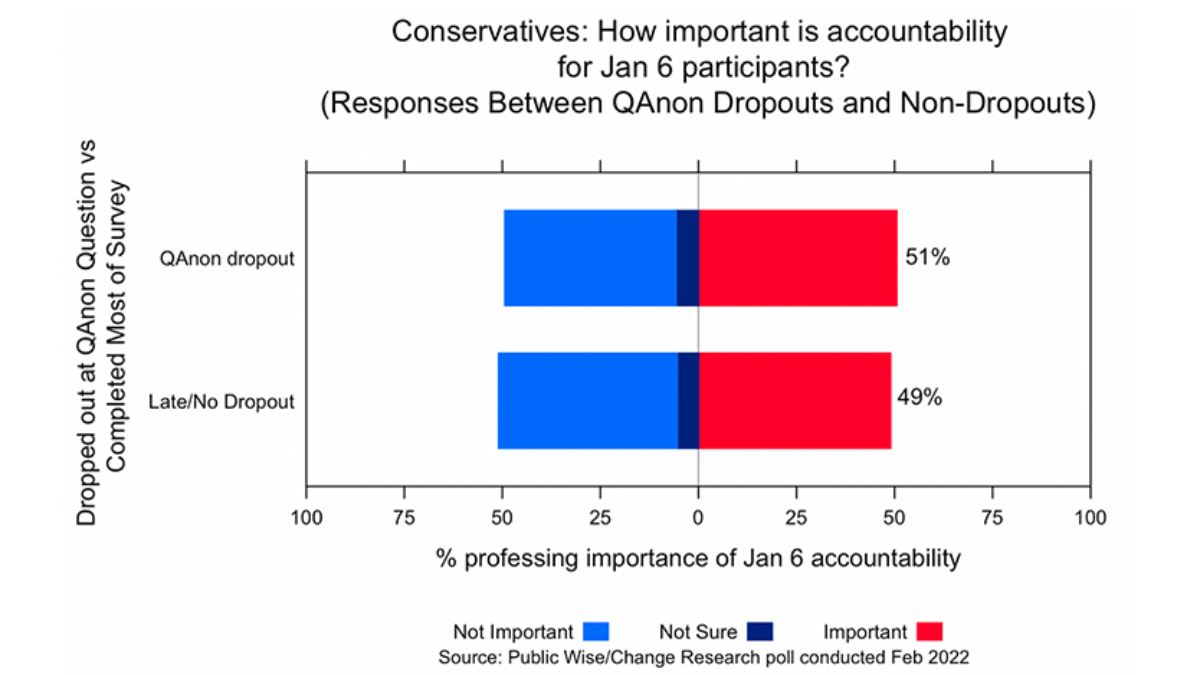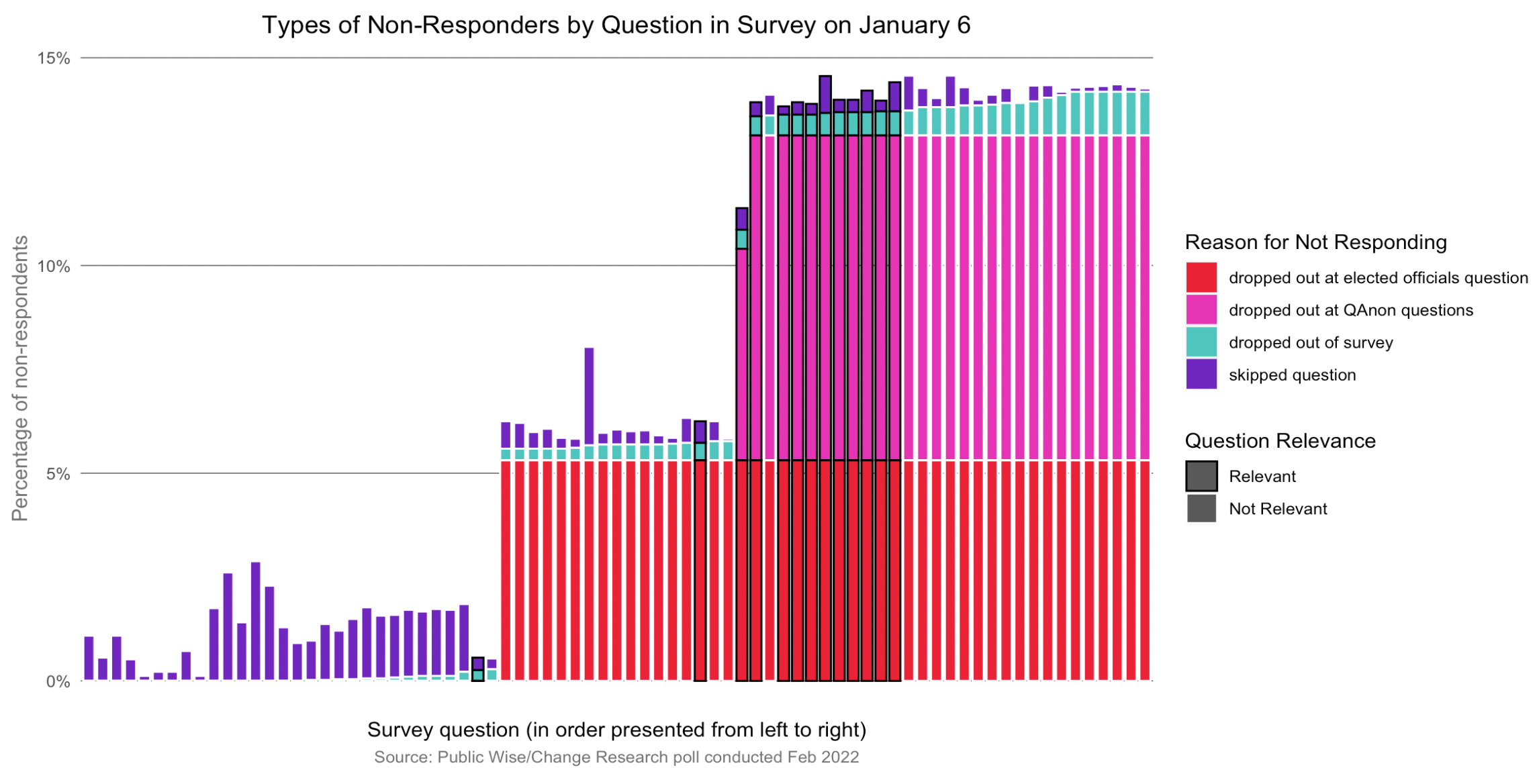Conspiracy Theories and January 6th
Belief in particular conspiracy theories helps explain why some conservatives do not want accountability for the January 6 Insurrectionists.
While thousands of people participated in the January 6 attack on the Capitol, one participant became the iconic and infamous face of this attack. Shirtless, smeared in American flag war paint, wearing a bison horn-and-fur headdress, and carrying a spear, Jake Angeli is featured on the cover articles for countless articles on the January 6 insurrection. He is better known as “The QAnon Shaman”.
Angeli’s previous political activity began after he was introduced to the community surrounding the QAnon conspiracy theory which alleges that the world, and particularly the U.S. government, is led by a circle of Satan-worshipping pedophiles who engage in child sex trafficking.
QAnon’s narratives continually evolve through cryptic posts on online message boards by a pseudonymous figure named Q who plays the role of a sort of leaker and oracle. Donald Trump plays a central role in Q’s posts. In the QAnon narrative, Trump is the wily underdog patriot selected to expose and root out this alleged global cabal of pedophiles. In the months leading up to the election, it was foretold by Q that Trump would spend his second term in office completing the mission of vanquishing these foes after handily winning re-election.
When Q’s forecast did not match the results of the election, many QAnon supporters claimed the election had been rigged, spreading rumors of rigged electronic voting machines and unchecked fraudulent voting. Angeli himself spoke at a rally outside of an Arizona courthouse on the day of the election, urging, “This election has not been called! Don’t believe that lie! They got their hands caught in the cookie jar and we’re going to the Supreme Court! Trump always looks like he’s going to lose. And then he wins.”
Belief in QAnon conspiracy theories motivated many of the insurrectionists at the Capitol. But how much of an influence does belief in the core QAnon conspiracy theory, and other conspiracy theories, have on public opinion around the Jan 6 attack? In February 2022, Public Wise and Change Research conducted a poll of 5,028 American adults to better understand the role of various factors in shaping U.S. public opinion around the attack.
Public Wise asked a wide-ranging set of questions. One key question we asked was, “How important do you think it is that the people who participated in the events of January 6th be held accountable for their actions if a court determines they broke the law?” Among both self-identified progressives and liberals, support for accountability was near-unanimous, and a small minority of moderates did not feel accountability was important. Conservatives, however, were split into roughly equal parts between those who thought accountability was important and those who did not.
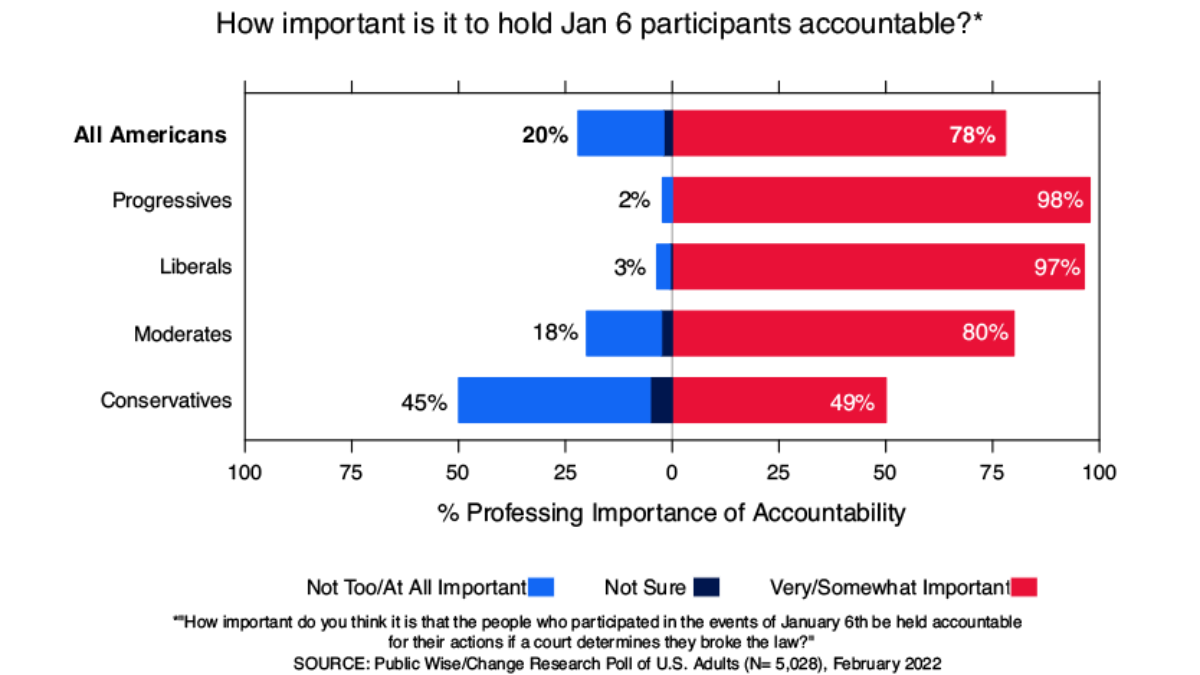
In previous blog posts, we explored two hypothesized factors for explaining what accounted for divisions in views on accountability among conservatives: Christian Nationalist and ethnonationalist ideology. Christian nationalism did not have a strong relation with views on January 6 accountability. Ethnonationalist attitudes were more strongly associated with desire for accountability – in particular, conservatives who did not believe that accepting diversity is important to being an American were much less likely to want accountability for January 6 participants.
In this post, we explore the relationship between belief in various conspiracy theories and views on accountability. (Please note that our analysis includes various categories of missing responses to our survey. For more information on how we understand and incorporate missing responses in the analysis, see the end of this blog post.) We find that belief in only certain conspiracy theories – belief that the voting machines in the 2020 election were rigged to give Trump votes to Biden, and belief in the core Qanon theory – are especially important factors distinguishing conservatives who want accountability for January 6 and those who do not.
Public Wise Survey
To understand the association between different types of conspiracy theories and attitudes towards the Jan 6 insurrection, we asked a series of questions about conspiracy theories, including those promoted by QAnon and people on the right as well as long-standing conspiracy theories about different events in history.
How much do you agree or disagree with the following statements?:
- The government, media, and financial worlds in the U.S. are controlled by a group of Satan-worshipping pedophiles who run a global child sex trafficking operation.
- Vice President Pence did not have the constitutional power to overrule the Senate and change the presidential election results (reverse coded)
- The people who broke into the U.S. Capitol were actually undercover members of Antifa
- Electronic voting machines changed votes for Trump into votes for Biden in the November election
- Vaccines cause autism.
- The COVID 19 vaccines are dangerous because they alter your DNA
- The COVID 19 vaccines are a plot to implant microchips into people
- The moon landing was faked
- I don’t believe the official story of the assassination of John Kennedy in 1963.
Modern Conservative Conspiracy Theories
Belief in conspiracy theories around the election, the January 6 events, and the core QAnon theory skew conservative.
Because much of the population has been exposed to the QAnon theories without necessarily knowing about QAnon itself, and also because admitting to trusting QAnon may be subject to social desirability bias, we asked about belief in the core QAnon theory regarding a cabal of Satan-worshiping pedophiles. Forty-three percent of conservatives ascribe to the core QAnon conspiracy theory that “the government, media, and financial worlds in the U.S. are controlled by a group of Satan-worshipping pedophiles who run a global child sex trafficking operation.”
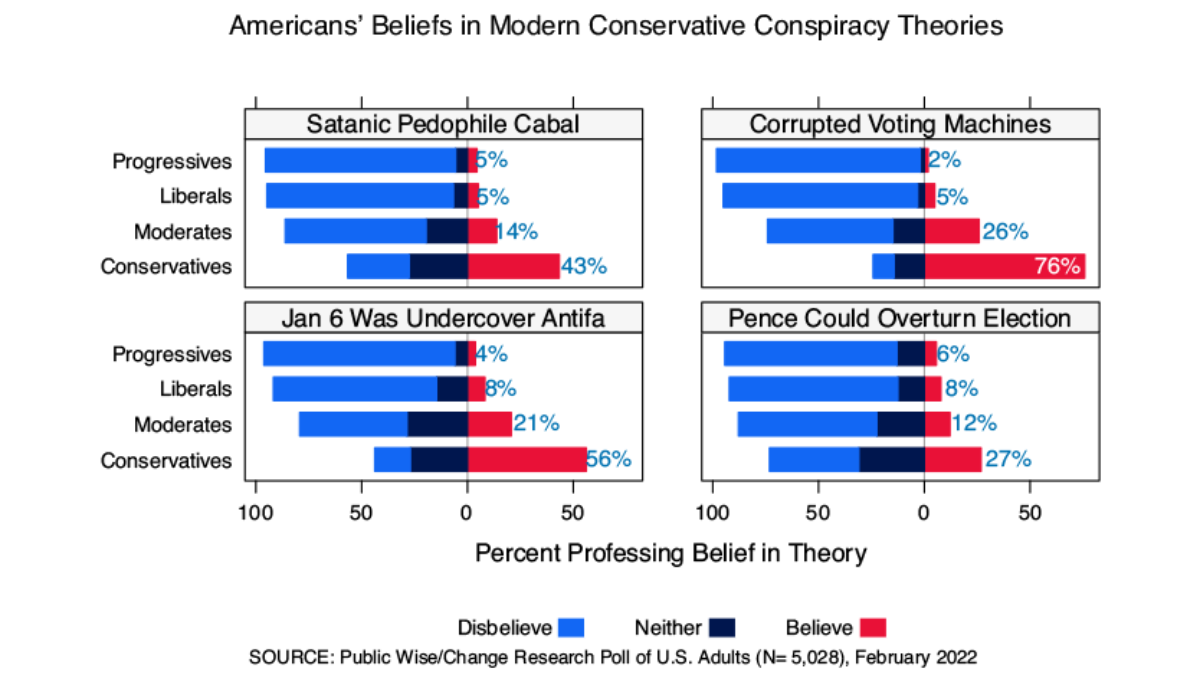
Conservative news outlets like One America News Network as well as high-level Trump supporters pushed claims that Dominion Voting System’s voting machines were rigged in order to change votes for Trump to votes for Biden, a view promoted heavily by Donald Trump and Rudy Giuliani in the lead up to the attack on the Capitol. Previous research by Public Wise found that while nonvoters of all stripes had mistrust in election processes in the US, white Republican nonvoters were much more likely to insist that outright fraud or deception had occurred. Here, we identify that a large majority of conservatives believe electronic voting machines were rigged.
Many social media users asserted that the rioters at the Capitol were in fact undercover members of the left-wing antifa movement attempting a sort of false-flag attack. This belief has persisted despite the lack of any evidence emerging from the extensive investigation into the January 6 events. We found that a majority of conservatives and a fifth of moderates agreed that the insurrectionists at the Capitol were undercover Antifa.
Despite Trump’s assertions, a majority of conservatives did not agree that former Vice President Pence was allowed to change the election results under constitutional law.
Vaccine Conspiracy Theories
Conspiracy theories around vaccines have become more widespread during the Covid-19 pandemic, especially in conservative circles. One conspiracy theory asserts that the Covid-19 MRNA vaccines work by permanently altering DNA. Another conspiracy theory contends that the vaccines are a plot to inject people with microchips that can be used as tracking devices. Even before the pandemic, a widespread conspiracy theory linked vaccines in general to autism.
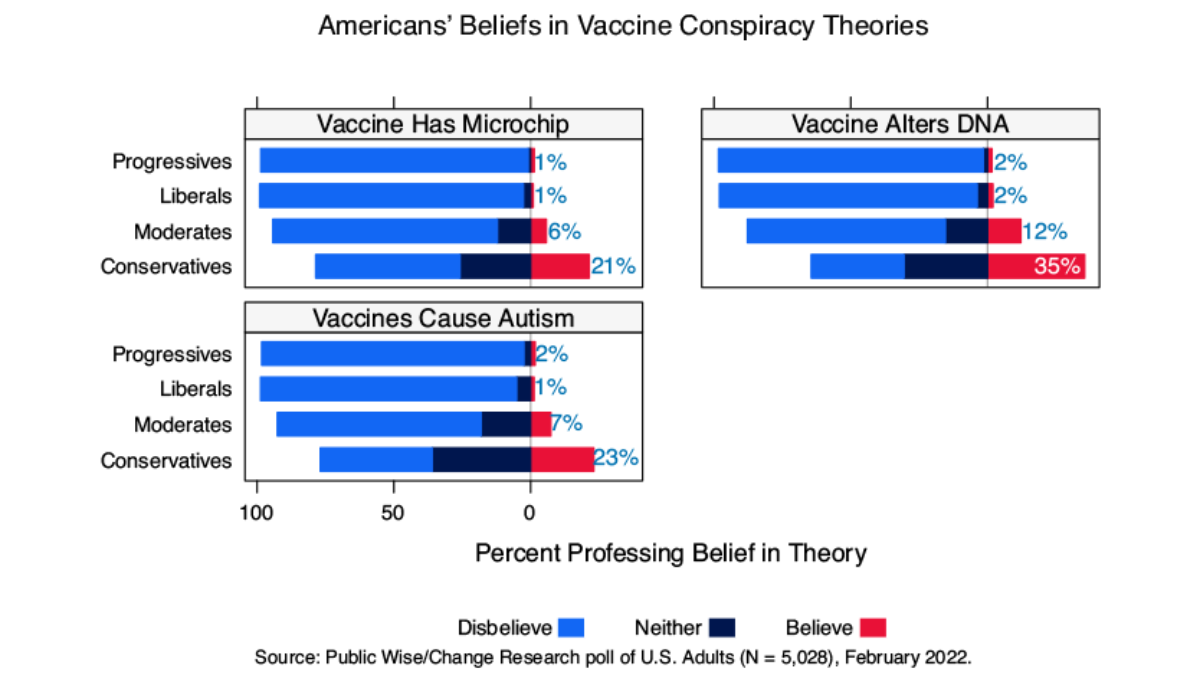
These beliefs tend to skew conservative, with a fifth of conservatives believing that the Covid 19 vaccines are part of a microchipping plot; 35% believing that the Covid 19 vaccines alter DNA; and just under a fourth believing that vaccines cause autism. 2% or less of progressives or liberals hold any of these views on vaccines.
Because these variables were closely conceptually related, with a relatively high internal consistency (Cronach’s alpha = 0.89), we combined these three measures into a scale variable for use in the main analysis, where 1 represents the highest possible belief in vaccine conspiracy theories, and 0 represents total disagreement to all vaccine conspiracy theories.
Classic Conspiracy Theories
The effect of believing in conspiracy theories relevant to elections or vaccines has a direct connection to the attack on the Capitol. But what about other conspiracy theories with no apparent connection to attitudes about the insurrection? We also wanted to examine whether believing in seemingly unassociated conspiracy theories was associated with attitudes and beliefs about Jan. 6th. We included three such theories.
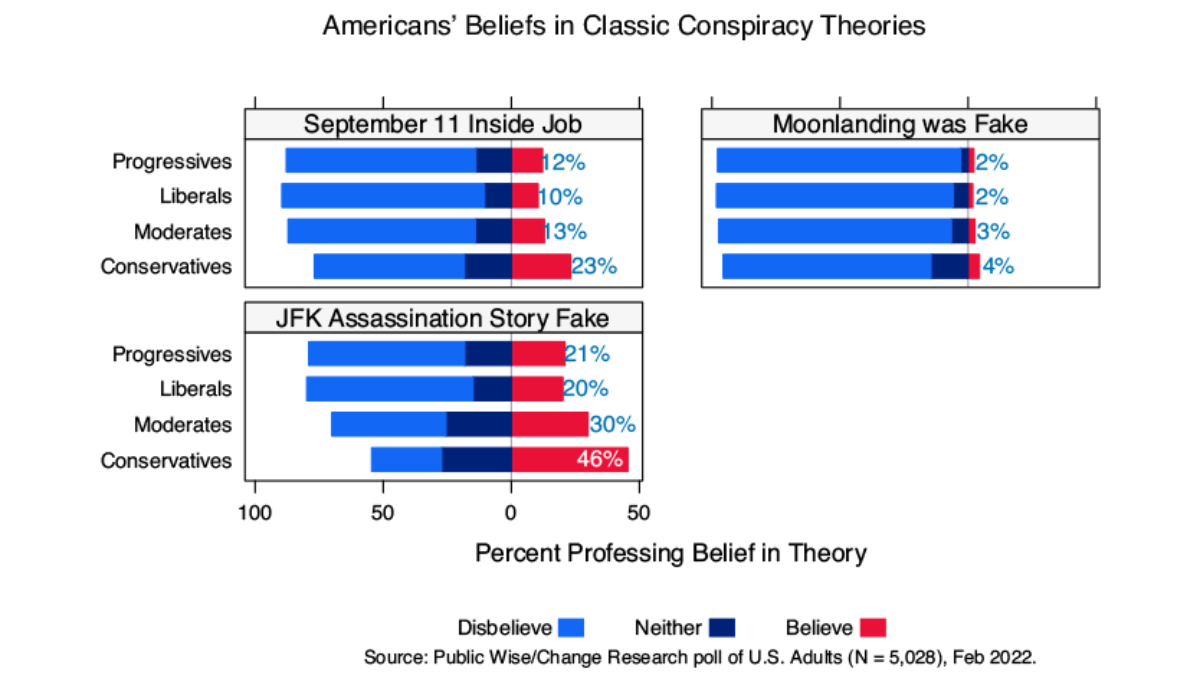
First, the conspiracy theory that September 11 was an inside job now has an over two-decade history in American politics. This theory contends that insider elites in the Bush administration either conducted a false flag operation or knew about the attacks and did not take action to stop them in order to justify an invasion of Iraq. Historically, liberals and progressives have been much more inclined to believe this view than conservatives.
Similarly, the belief that the moon landing was faked has not been ascribed to any particular political or ideological group, but has historically been believed slightly more by those who lean left.
Lastly, the 1963 assassination of President John F. Kennedy has spanned a number of conspiracy theories. In 1964, the Warren Commission concluded that Oswald acted alone in assassinating Kennedy. However, many polls, depending on wording, find that a large percentage of Americans have doubts about the lone gunman theory, and Republicans were more likely to believe the theory than Democrats.
Although findings may differ due to a variety of factors like specific wording, our survey found that partisan leanings on these conspiracy theories, compared to historical trends, had flipped. The beliefs that the September 11th attack was an inside job, the moon landing was faked, and the official John F. Kennedy assassination narrative is fake all tend to skew somewhat conservative.
Few Americans believe the moon landing was faked, regardless of ideology, but twice as many conservatives believe it than liberals and progressives. Between 10% and 23% of Americans believe that September 11th was an inside job, but this view is much more likely to be held by conservatives. And while 21% of progressives do not believe the official story of the JFK assassination, the percentage of conservatives who disbelieve the official story is almost half.
Desire for Accountability Among Conservatives Is Strongly Correlated with Belief in Certain Conspiracy Theories
We again focused our analysis on conservatives, who are divided roughly in half on views on accountability. We found that overall, conservatives who believe in conspiracy theories are less likely to want accountability for insurrectionists, but certain types of conspiracy theories were more strongly correlated with views on accountability.
Modern Conspiracy Theories
Belief in the QAnon core theory was correlated with views on accountability. Two-thirds of conservatives who do not believe the core QAnon theory think accountability is important. Those who claimed they ‘neither believe nor disbelieve” wanted accountability at about the rate of the median conservative. For those who believe the conspiracy theory, just 40% want accountability for insurrectionists.
Belief in the rigged voting machine conspiracy theory was a very strong divider of conservative viewpoints on accountability for insurrectionists. 82% of conservatives who did not believe this conspiracy theory said they wanted accountability, a rate slightly higher than moderates. Just 43% of conservatives who believed that the voting machines were rigged for Biden wanted accountability.
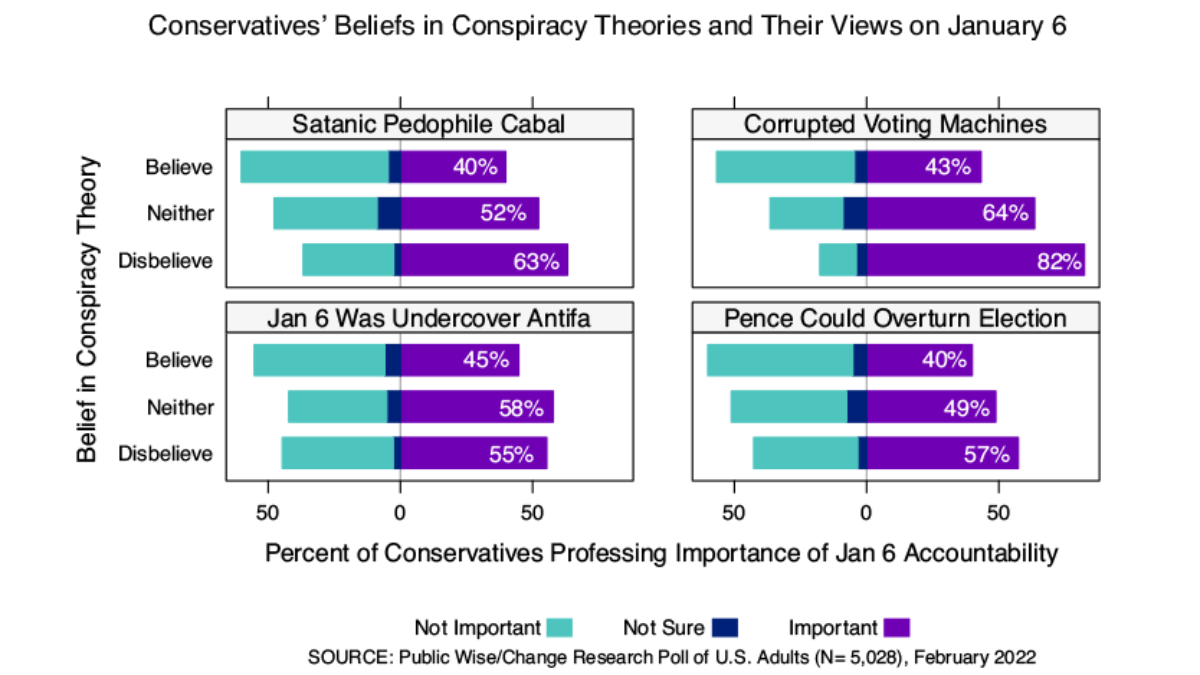
We might expect that the undercover Antifa conspiracy belief –if held by conservatives who presumably oppose Antifa –would result in wanting more accountability for insurrectionists among conservatives. But curiously, those who professed to believe this were less likely than the average conservative to want accountability. Additional insight into this finding is difficult to glean from available data. One explanation could be that those who believe this theory are the most conspiracy theory-minded in general, correlated with other beliefs that lead to decreased desire for accountability. Alternatively, professed belief in this theory could be disingenuous.
Lastly, 40% of those who believed that Pence had the right to overturn the election wanted accountability, whereas 57% of those who disagreed thought accountability was important.
Vaccine Conspiracy Theories
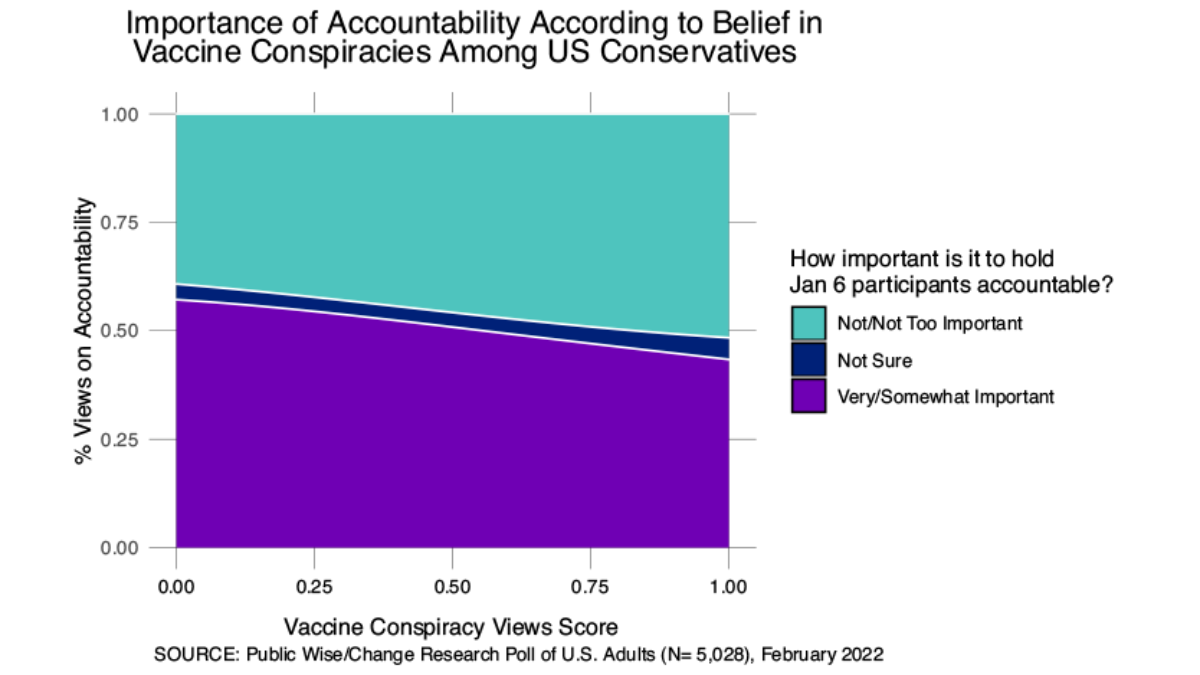
We find that belief in the vaccine microchipping conspiracy theory is correlated with views on accountability, but not strongly. Among conservatives who strongly disagree with all vaccine conspiracy theory views (scoring 0), more than half think accountability is important, and among those who strongly agree with all vaccine conspiracy theories, less than half want accountability. Vaccine conspiracy theory beliefs are more strongly correlated with views on accountability than other factors like Christian nationalism, but less than other more directly-related conspiracy theories.
Classic Conspiracy Theories
All the previous conspiracy theories can be connected in some direct way to the 2020 election, but what about conspiracy theories that are unrelated? We found that even conspiracy theories with no clear connection to the election were correlated with views on accountability.
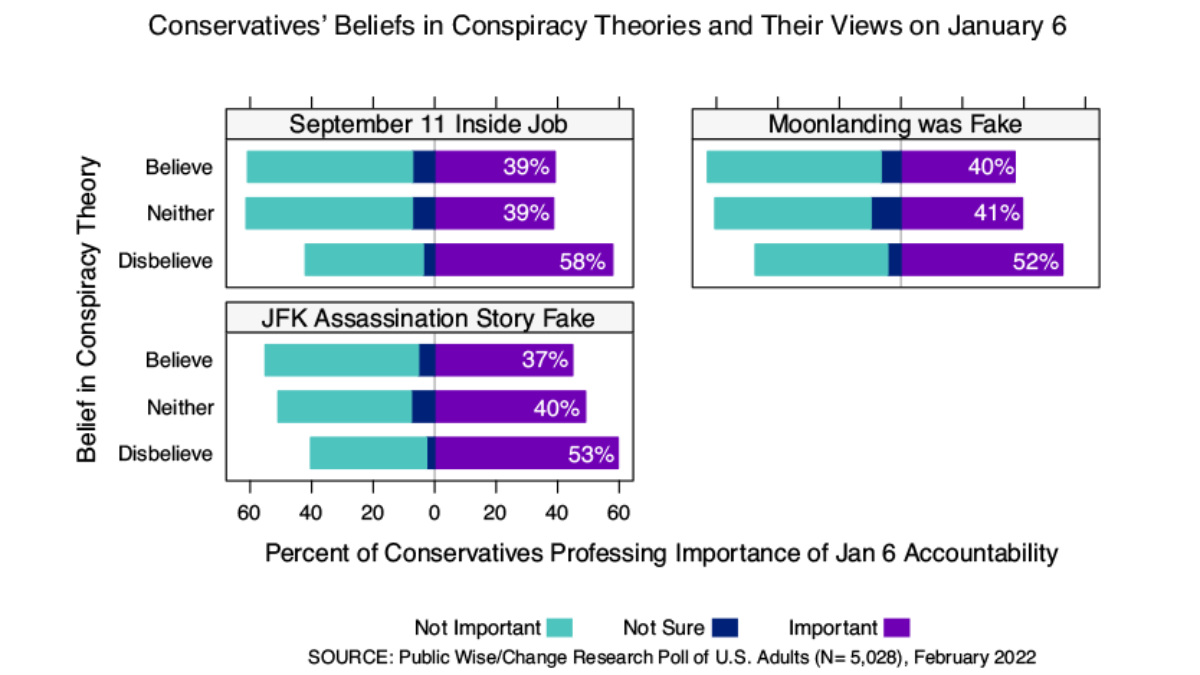
Belief in traditional conspiracy theories totally unrelated to the Trump presidency and current day politics were still correlated with views on accountability. Just 39% of conservatives who think September 11 was an inside job want accountability for insurrectionists versus 58% who do not believe this theory.
The theory that the moon landing was faked is also correlated with views on accountability. However, a very small number of Americans held this belief, especially among progressives and liberals, so we are hesitant to declare this finding conclusive.
JFK assassination conspiracy theories precede the 2020 election and January 6 attack on the Capitol by over a half century, so we might assume they have a weak connection to belief in the importance of accountability. However, we find that conservatives who disbelieve the official story of Kennedy assassination are also much less likely to want accountability.
Which Theories Really Matter?
While all the conspiracy theories we investigated were correlated with views on accountability, a problem for understanding the true relationship is that belief in all of these conspiracy theories tends to be intercorrelated. In our white paper, we run a model which helps us understand the relationship between belief in conspiracy theories and our other variables while accounting for potential interactions between them. We found that belief in two particular conspiracy theories were important for predicting views on January 6 accountability: 1) belief in rigged voting machines that gave votes to Biden; and 2) Belief in the core QAnon conspiracy theory about a cabal of Satan pedophile elites.
Our study found that other factors relating to antiestablishment attitudes were also important to understanding views on accountability among conservatives . We will cover these more in a future blog post, or you can read our complete findings and technical analysis in our white paper.
Notes on Missing Data
Our missing responses in the survey were not at random, but were concentrated around respondents dropping out at two politically sensitive sections of the survey. Therefore, instead of excluding them from our dataset and only using respondents who answered all relevant questions, we included these respondent dropouts as an integral part of the analysis. Because these dropouts occur before and after different relevant questions in the survey, the analyses in this post use a range of none, one, or two categories of missing responses. For a more detailed understanding of missing data in our survey, how we think about dealing with missing data, and why we decided to include it in our analysis instead of ignoring it, take a look at our post on this topic.
For a visualization of where missing responses occur in the questions relevant to the analysis in this particular blog post, see the visualization below:
Quick Links
Because those who dropped out of the survey at the QAnon questions did not go on to complete any of the other questions related to conspiracy theories, we do not know these respondents’ views for these measures. We do know that those who dropped out at the QAnon questions were disproportionately likely to self-identify as conservative.
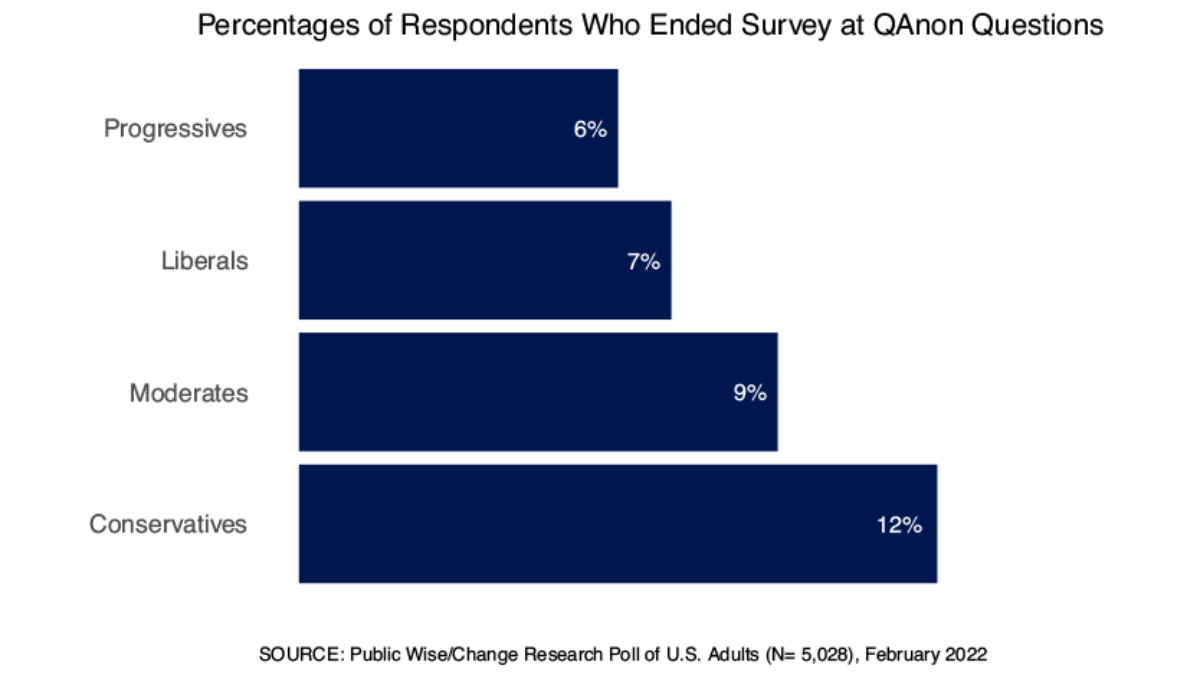
But, as can be seen below, it seems that for conservatives who dropped out of the survey at the QAnon questions, their views on accountability are comparable to conservatives who completed most of the survey.
